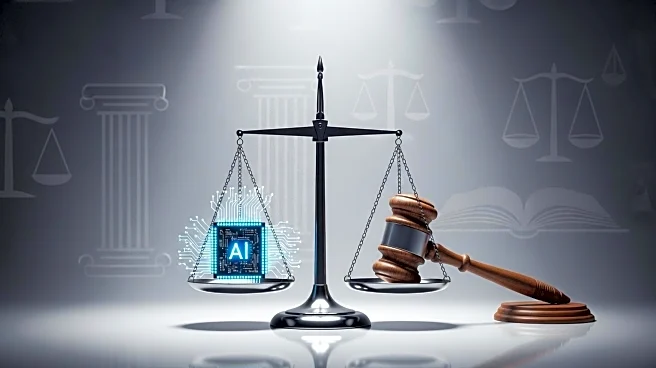What's Happening?
The legal industry is increasingly incorporating artificial intelligence (AI) into its practices, but this integration is raising ethical concerns. According to a report, while attorneys are becoming more aware of the benefits AI can bring to their practice, there is a lag in understanding the ethical implications associated with its use. The report suggests that lessons learned from the integration of the internet into legal practices can help mitigate these ethical risks. The legal community is urged to apply existing ethics rules to address the challenges posed by AI, ensuring that its use does not compromise ethical standards.
Why It's Important?
The integration of AI into legal services has the potential to significantly enhance efficiency and accuracy in legal processes. However, the ethical challenges it presents could impact the trust and integrity of the legal profession. If not properly addressed, these challenges could lead to ethical breaches, affecting client confidentiality and the fairness of legal proceedings. The legal industry must balance the benefits of AI with the need to uphold ethical standards, which is crucial for maintaining public trust and the rule of law. This situation highlights the need for ongoing education and adaptation of ethical guidelines to keep pace with technological advancements.
What's Next?
As AI continues to evolve, the legal industry is expected to develop more comprehensive guidelines and training programs to address its ethical use. Legal institutions and professional bodies may introduce new regulations or update existing ones to ensure that AI is used responsibly. Additionally, there may be increased collaboration between legal professionals and technologists to create AI systems that align with ethical standards. The industry will likely see a push for transparency in AI applications to ensure accountability and protect client interests.
Beyond the Headlines
The ethical challenges posed by AI in the legal field also raise broader questions about the role of technology in society. As AI becomes more prevalent, there is a need to consider its impact on privacy, decision-making, and the potential for bias. The legal industry’s approach to these challenges could serve as a model for other sectors grappling with similar issues. This development underscores the importance of interdisciplinary collaboration in addressing the ethical dimensions of AI.











